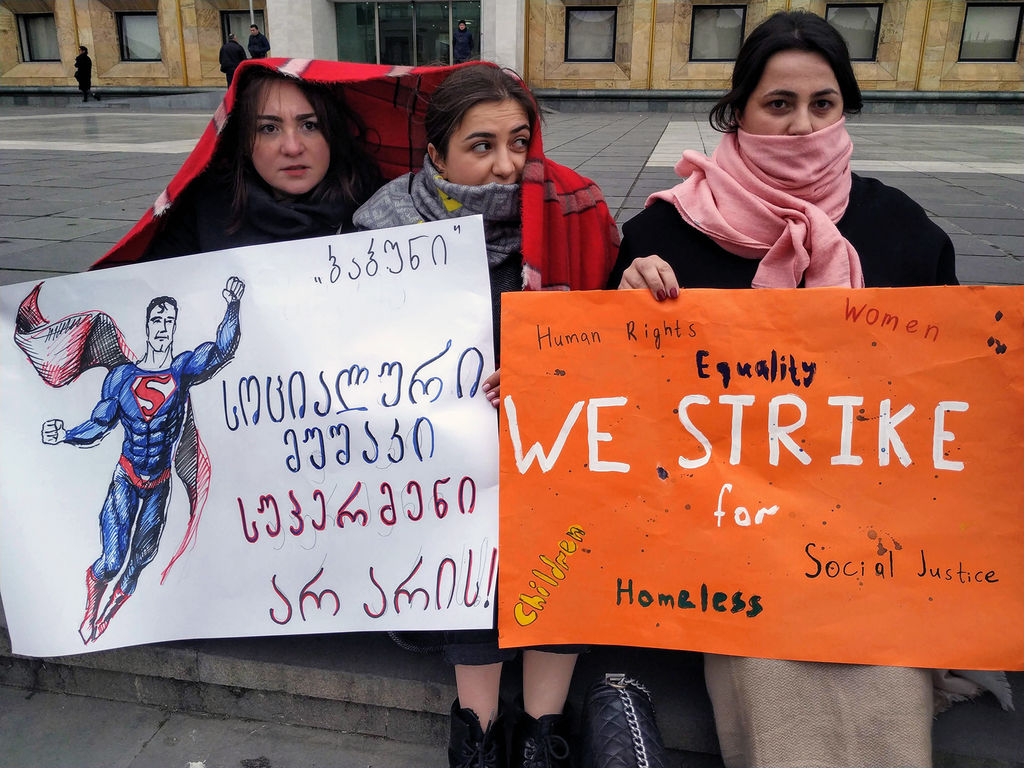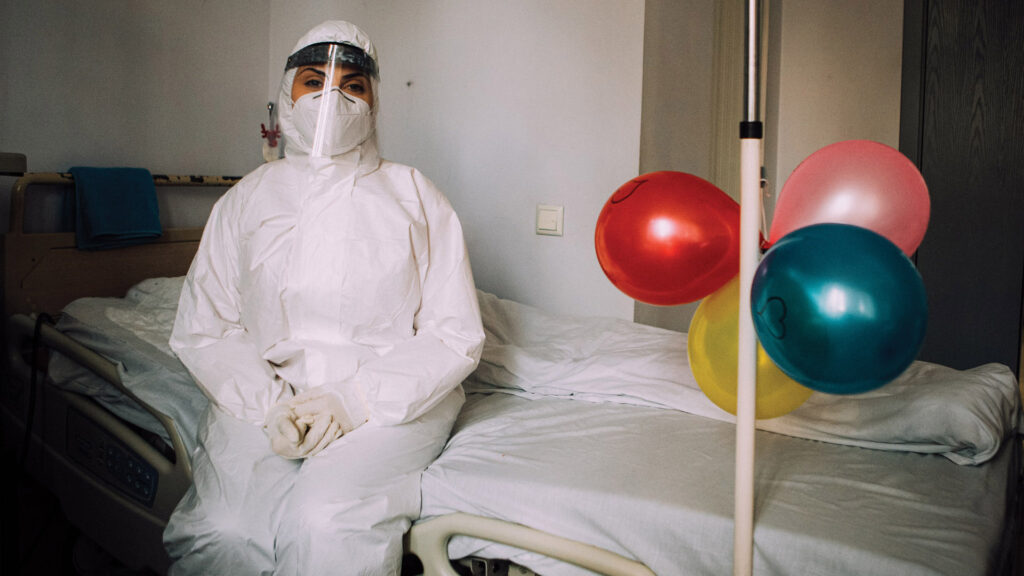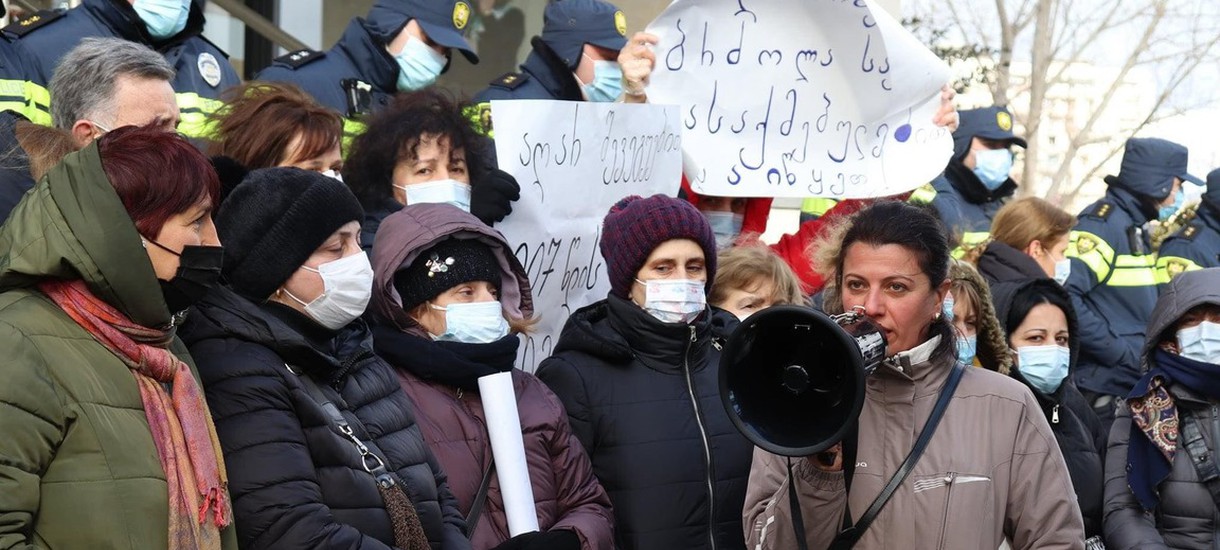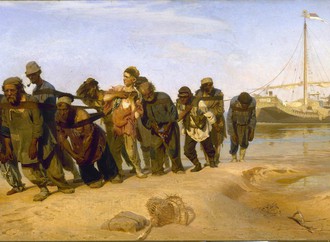Although Georgia differs significantly from Ukraine in size and population, we have much in common. In particular, we are united by the past, as well as the common, albeit different in scale, the experience of invasion by the Russian Federation, respectively — war, destruction, displacement of large numbers of people and the resulting poverty.
However, in addition to historical parallels, there are great socio-economic similarities. At one time, Georgia in Ukraine was seen as an example of the fight against corruption and successful reforms. All these reforms were guided by neoliberal logic of public cost-cutting, privatization, deregulation and so on. These approaches are still involved in both countries, leading to similar problems.
In this article, Georgian activist Sofia Japaridze describes how neoliberal politicians are leading to low wages, instability and outright impoverishment of Georgia's care workers. She also talks about the self-organization and struggle of women workers for better conditions and wages. Although similar problems and struggles have taken place in Ukraine, Georgia's experience shows how far anti-social reforms can go, despite the need for social support after the war. We are already seeing labor rights being curtailed in Ukraine under the guise of war. So we need to take a closer look at Georgia's example to understand what neoliberal politicians can do in a poor war-torn country.
Georgia is a small country inhabited by only 3.7 million people - this scale should always be kept in mind. According to the National Statistics of Georgia we have 1.2 million people less now than we did in the 1990s (about 24% loss of population). One of the basic causes of such a demographic dynamic is failure of social reproduction - ability of society to provide the vital support for its population. And one of the sectors, which is integral to social reproduction, is the care sector, encompassing all the infrastructure, where predominantly women-workers are caring for people. Hence, attention to this sector is essential for the society, for understanding its development, for improvement of the situation of working-women.
From the caring poor to united care
The workers in the care sector in Georgia are the working poor. They work full time jobs only to be socially and economically vulnerable themselves while most of them say they are unable to carry out their own family’s social reproductive work at home due to exhaustion from “paid” work.
At the same time, due to low wages and long working days across the country the beneficiaries of care work are set up opposed to the care worker. Welfare workers are vehemently despised by benefit recipients since they believe the welfare workers are responsible for any cuts to their benefits despite the fact they have no power to do so. Parents of autistic children who have needed therapy and support for their child for years cling on to the only meager service the city provides which comes at the cost of therapists’ unpaid work. Patients often complain about unprofessional nurses and bad healthcare when nurses are so overworked and underpaid, it's physically impossible to give good care in these conditions. The systemic problems of care work, especially its under financing and commodification due to almost all of them being created under assumptions that austere small government is best, is blamed on the persons working there since these are the faces we see representing these institutions and programs.

Social workers protested the Georgia government in March 2019. On the poster on the left: "Social workers are not supermen!" / OS Media.
The rate of emigration in Georgia is staggering. A lot of people migrate to work in the sphere of social reproduction. Many women are employed now in care work in the country and find it easiest to transition into care work abroad. Labor conditions abroad are as awful as they are in Georgia, but the wages and purchasing power are much higher.
These failures of social reproduction and artificial social divisions can be attenuated through unionization and social struggles for a living wage and the 40-hour working week. Currently the easiest option for care workers is to emigrate instead of forming a union and fighting for better working conditions. However, winning a few victories can give impetus for others to stay behind and fight for their labor rights within reason.
Our union mainly organizers workers in the service sector. Social welfare workers, nurses and behavioral therapists among others. Below I will discuss the main problems of the care sectors and victories we have been unionizing during the last years.
A long-wanted and highly exploited therapy
The behavioral therapists work in a municipal program which offers therapy for children on the autism spectrum. We also have members who work as nurses, although not many. One of our focuses has been on securing not a minimum wage, but a living wage for nurses. We have also conducted studies on the working conditions of nurses. We have developed our own methodology for determining the amount a living wage should be.
There are a lot of problems with how social programs are financed. For example, the wages of therapists are based on an amount of money allocated per child for each session. The mayor contracts out to service providers and service providers hire the therapists. They might take over half of the per child fee. By the time the funds reach the therapist, there is barely anything left. Different providers also have different contracts for therapists. Some have labor contracts and some have service contracts. Service contracts have less protection. If the therapy session doesn’t happen, the therapist doesn’t get paid. Often parents don't bring their kids in for sessions during Summer or holidays, so there’s a 10% no show rate every month, which means the therapists see their pay reduced. Whenever therapists speak up and demand better wages, the employers, parents and the city claim that “this is the children’s money.”
In our study, only two therapists acknowledged that work outside of the immediate session should be counted as paid work. It was shocking to see how they themselves didn’t think they should get paid for work done outside of the session, such as preparation and paperwork, that has a direct impact on the session itself. The therapy program itself is a victory - there was no government supported program for children with autism until parents and NGOs organized and fought for it. Not only was this a huge and unprecedented victory in Georgia, but now the demand to utilize it is high.
It’s difficult to criticize it and have difficult conversations around it because it's considered a victory and vital to children’s wellbeing. This financing scheme shows how vulnerable it is when during COVID everything shut down and the therapists were left penniless. The mayor told them they were not going to get paid during the lockdown. Through our mobilization, they were able to retain pay during lockdown but they had to make up for it via online lessons, and they had to work even more unpaid hours to reformat themselves online. Despite the backlash from a few parents, the campaign to get paid during Covid united most parents and therapists and thus broke the chain of opposing interests - even if it was momentarily.
Living wage for a life-saving care
Let's take a look at the healthcare sector. Almost all healthcare in Georgia is privatized, however, in 2013, a universal health coverage program began. Although the coverage is single payer insurance, once people started actually using the care and going to hospitals prices increased - price gouging began. In a 2017 World Bank study, the high cost of universal coverage was criticized. Patients wanted to go to hospitals which means they wanted labor intensive care. In general, people wanted to and still want to receive care in hospitals. People understand that at hospitals they will be taken care of and receive adequate medical care. However, experts still push outpatient care. This forces families to bear more responsibility. At the same time, we have one of the lowest hospitalization rates - people stay less, go less and when they do go their stays are short. When the population needs more hands-on care, they are given a much more trimmed down option.
Despite Georgia having one of the highest costs and least amount of services offered, the nurses make the lowest amount in the region with incredibly high patient to nurse ratio rates. This situation only got worse during the Covid-19 pandemic and continues to get worse. The additional funding provided by the government for Covid patients doesn’t go to the nurses fully since the nurses aren’t even told how much the extra fees are so the hospital pockets the extra funds.

The nurse of the central hospital in Tbilisi Nona Mkhitaryan was forced to work even after she picked up the COVID-19. Colleagues support her with balls / Dato Coridze / RFE / RL.
If nurses' pay increases, their patient to nurse ratio goes down, they will be able to give better care to patients that are in desperate need of health care. Nurses currently have to work many jobs to make a living, if they had one job with a living wage, they could have time to improve their skills, get extra training, be in better physiological and psychological condition to deliver good care.
Social services for social workers
The social service workers also receive performance based pay: they get wages according to how many houses they visit. They get a base pay of 80 GEL (approx. 790 hrn) and on top of that an amount per house they visit. During the COVID pandemic, they couldn’t visit houses, so only new people who wanted to get welfare would be checked. There weren't as many houses to visit. They already had other problems with paperwork and lost their ability to work autonomously by making subjective assessments regarding house visits and other decisions. Now, an algorithm makes important decisions. Instead of streamlining services it has resulted in those who should be receiving services being denied due to algorithmic inaccuracy.
We had a strike process last year as well. However, when Covid pandemic slowed down, some Social Service workers had been infected one, even two times with COVID. The families who rely on social service money have an incentive not to be truthful about their condition or whether they’ve been exposed to COVID. Unfortunately, this puts Social Service workers at risk and ironically they have less health care coverage than those who are receiving social services. They have been unable to receive necessary surgeries because they don’t have good insurance. Welfare recipients get more benefits than the workers who administer them. One of the main union leaders even applied for welfare and received it from the same agency she works for.
People work for an income so they don’t need to be on welfare. The Social Agency is creating a vulnerable workforce. They don’t want to empower labor, but they want to provide funds as assistance or charity: at the end of the day these are neoliberal anti-worker policies meant to just help the very poor and extremely destitute instead of improving the conditions of working people based on empowering labor. They implement programs that reduce extremes with the goal of providing statistics that look good, despite the inability of the policies to address root causes. Laborers, unions, well-paid workers, and empowered workers - ensuring these are never a priority.
Struggles and solidarity
In January 2022 our union, Solidarity Network, organized a strike of welfare agency workers. The strike lasted one week and involved over 400 workers. It was one of the most successful strikes in recent history due to a perfect storm. Since the opposition-controlled media was not occupied with other news, they were more than willing to cover the strike. For over a week, almost every channel and show featured welfare workers and our union. Journalists and strikers talked about poverty, care work, inflation, low wages, and emigration. This was divergent from the usual empty political party bickering television. More in-depth conversations about problems with social assistance were possible. Even after the strike, the media invited our union members to continue to speak about the failures of the current welfare system.

Protest of social workers in Georgia for raising wages / Georgian association of social workers (GASW).
An internally displaced person (IDP), who had been petitioning the Social Affairs Ministry for housing, was on the same show with an agent on strike. The IDP said how much she struggled with the social field agent assigned to her. She resented her. She shifts to the agent and says something like, I didn’t know how low your wages were and how bad your conditions were at the time! The strike and its media coverage created empathy between social assistance recipients and workers. The recipients were calling their welfare workers saying, we didn’t know how bad it was, and we are behind you!
So there was an incredible victory by becoming dignified and humanized through the collective and public struggle. They won their first wage increases in 15 years including transportation costs they were paying out-of-pocket. We also won paid maternity leave. Solidarity Network prioritizes social reproduction, and our union worker leader was a mother of three children, one of our demands was paid maternity leave.
The strike activity and unionization of social welfare workers are essential in breaking the cycle of opposing interests. Social welfare workers resent social beneficiaries since they get paid more than them while not working and at the same time the beneficiaries resent them for social policy shortfalls. By securing better pay for social welfare workers help ease resentment and their unionization means more ability to organize and give input in how social assistance is set up on a national level, therefore, they can become advocates of beneficiaries.
***
These three spheres within the care sector illustrate both the challenges and possibilities of overcoming those divisions between beneficiaries and workers. They also point to the possible lessening of emigration rates through unionization and labor victories. Social programs being set up under austerity principles is the main culprit of dividing worker and beneficiary, and the breaking of these principles will take the workers to organize unions and by fighting for their improved working conditions also improve social programs and organize them under solidarity principles. This is the only way not only to improve the lives of working-women, but also to refigure the social reproduction of the Georgian society in a way to halt the destructive dynamics of the neoliberal transformation.





